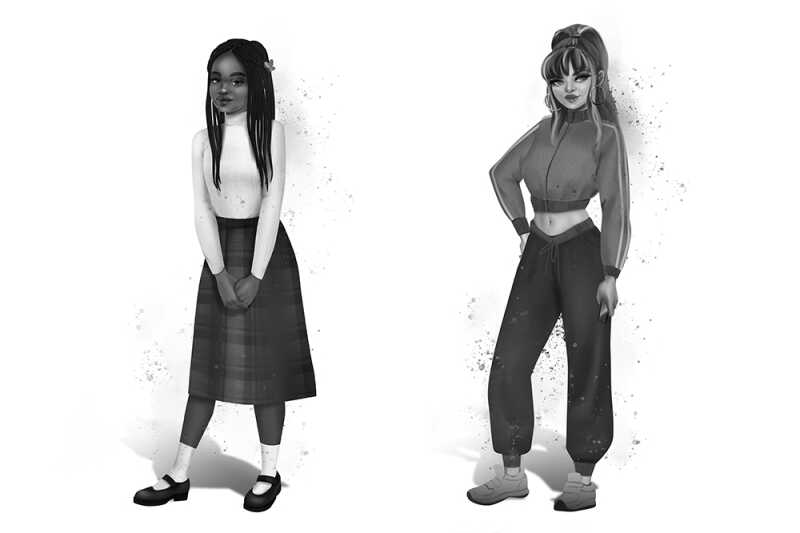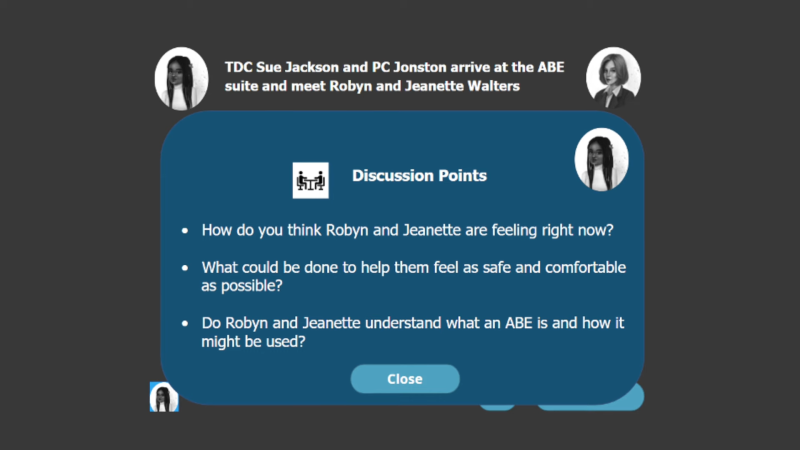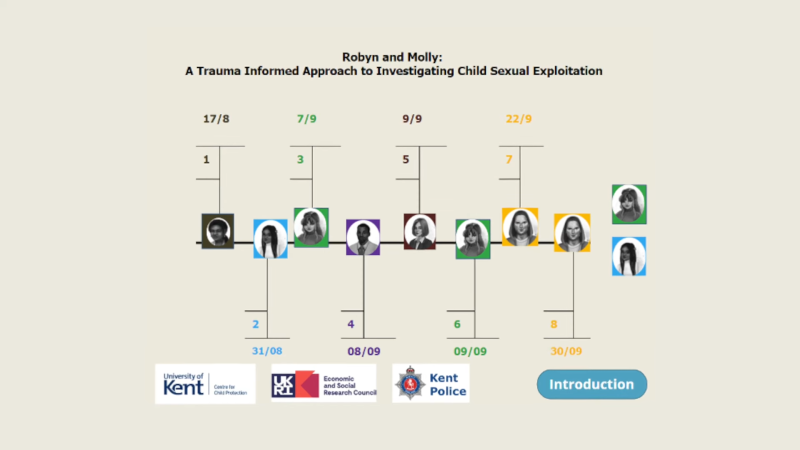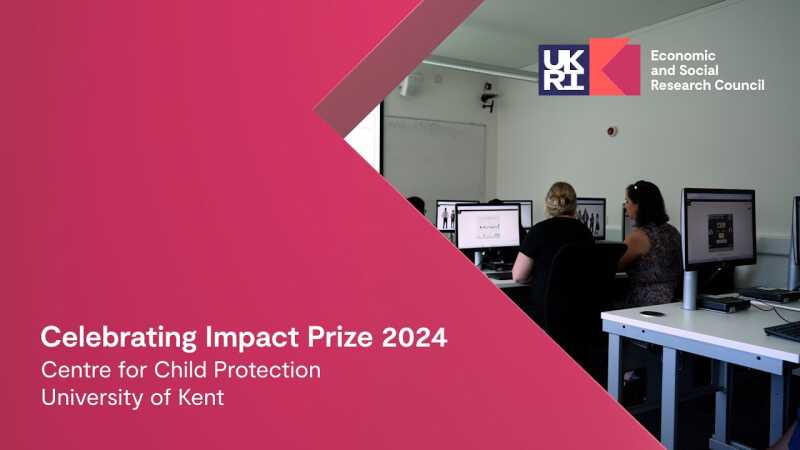‘Robyn and Molly’ is an award-winning training tool created in partnership with Kent Police and underpinned by ESRC-funded research. The training follows an innovative and immersive simulation-based training experience designed to equip professionals within the police force with the expertise needed to carry out trauma-informed assessments and investigations, and to support victims during cases of child sexual exploitation.
View transcript (opens in a new tab)
About the ‘Robyn and Molly’ training simulation
'Robyn and Molly' is an interactive simulation that follows the stories of two characters who are navigating the complex world of child sexual abuse and exploitation. Through diverse characters and decision-making scenarios, participants are able to develop necessary competencies in conducting trauma-based investigations.
We know that child protection and child sexual exploitation are sensitive subjects, therefore, when joining one of the Centre for Child Protection’s simulation training sessions, you can expect a learning environment which encourages deep thought and decision-making in a safe environment. Your wellbeing will also be taken into consideration by our expert facilitators.
Participants will engage in an immersive storyline that challenges them to apply their knowledge and experience in realistic situations. Upon completion of the simulation training, participants will leave with improved understanding of how to conduct a trauma informed investigation and with the confidence to provide trauma informed support for the victims.
The ‘Robyn and Molly’ training can be delivered as a single days’ training. The session will ideally be delivered in-person, and our expert facilitators are happy to travel to your place of work to deliver the session, or make arrangements on our campuses outside term time. Remote training is possible in extenuating circumstances only, as the immersive, collaborative stylings of simulation-based training means that maximum benefit is best achieved in an in-person environment.
This training can be delivered as a one-off, or the Centre for Child Protection can build a bespoke training course for your organisation that includes ‘Robyn and Molly’, as well as other available simulations. At the Centre for Child Protection, we adopt a collaborative approach. Our goal is to work with you and your organisation to understand your learning and development needs, as this will inform our recommendations and advice regarding the training programme.
Make a positive impact on your organisation’s service offering. Contact us to discuss how our bespoke training solutions can help you achieve your goals.

What will I learn from this simulation?
Through the 'Robyn and Molly' simulation, participants will:
- Develop knowledge around identifying and recognising child sexual exploitation
- Develop the ability to engage empathetically with children who have experienced child sexual exploitation
- Improve understanding of trauma-informed support for child sexual exploitation victims during and after investigations, and throughout court proceedings
- Strengthen their proficiency in actively investigating child sexual exploitation cases
- Gain an increased understanding of preparing and presenting child sexual exploitation cases to the Crown Prosecution Service (CPS)
- Learn to recognise and respond to secondary trauma in oneself and colleagues
The simulation incorporates key features such as the Window of Tolerance, which enables participants to use professional curiosity to recognise the impact of trauma on the characters and understand how this relates to their attitudes and behaviours within the Betari's Box model.
Participants will also have the opportunity to consider and apply trauma-informed approaches for each case, as well as explore the push and pull factors of child sexual exploitation. These interactive elements provide a comprehensive and immersive learning experience that equips professionals with the expertise needed to effectively support victims and investigate cases of child sexual exploitation.
This [simulation training] will assist my engagement and investigations every day moving forward, wish I had sooner.
About the research underpinning this training
The simulation training tool, ‘Robyn and Molly: A Trauma-Informed Approach to Investigating Child Sexual Exploitation’ was developed in partnership with Kent Police and funded by the ESRC. ‘Robyn and Molly’ is rooted in wider research into, and the contextual understanding of, violence against women and girls (VAWG), its impact on victims, and the possible best practices to be followed by those carrying out investigations and providing support.
In England and Wales between 2021-22, there were 17,486 crimes logged by police where children had been sexually exploited—an average of 48 offences a day (NSPCC 2022). VAWG, including sexual exploitation, is a public protection issue and, as such, police should understand trauma and be able to respond to traumatised girls with lived experiences of sexual exploitation. A trauma-informed approach is regarded as an essential framework to support these girls and promote their physical and psychological recovery (UNCRC 1989 Art 39).
The ‘Robyn and Molly’ tool utilises a proven, innovative technology and the established pedagogy of ‘serious game’ simulation training. The simulation was co-created between the Centre for Child Protection and Kent Police and seventy-seven officers trained in a fully evaluated pilot of the simulation. 99% of the trained officers found the training course to be helpful or very helpful in improving their knowledge and understanding of trauma-informed investigation of child sexual exploitation cases.
ESRC Celebrating Impact Prize
The success and transformative impact of ‘Robyn and Molly’ led to its nomination for the prestigious ESRC Impact Prize 2024 in the category of Outstanding Societal Contribution. We are proud to have been named runners-up in this highly competitive field. Discover more about the remarkable impact of this project by watching the video below.
About simulation training
Simulation training is an immersive, learner-centred training style that encourages participants to think deeply and collaborate openly in a risk-free environment. Participants will be exposed to challenging, thought provoking scenarios based on authentic cases. Trainees are offered the opportunity to learn about different strategies to handle future, real-life scenarios by expanding their expertise and understanding. This approach promotes critical thinking, skills retention, collaboration and the development of practical knowledge in situations that can be complex, challenging and extremely nuanced when in the field.
The Centre for Child Protection offers a range of simulations, and each has been designed to address specific needs of different safeguarding roles and organisations. ‘Robyn and Molly’ is designed specifically for members of the police force, and the Centre for Child Protection strives to provide safe, reflective spaces that push participants into new learning territories.

Who is this training for?
‘Robyn and Molly’ has been specially designed for all professionals working within the police force, including, but not limited to:
Detectives: Any member of the police force who investigates cases of child sexual exploitation will ideally possess specialised knowledge to conduct research and investigations that are empathetic to the victims’ experiences and also minimise the risk of additional trauma. This training focuses on developing trauma-informed skills and using them effectively while working on cases
Specialist units dealing with child protection and child sexual exploitation cases: While members of this unit are likely experts in their subject matter, this training will provide additional context and insight into the types of characters and stories that may come up in cases. These professionals will benefit from advanced training to help them better understand, and deal with, the complexities of child sexual exploitation and how to utilise trauma-informed practices in their day-to-day work
Police leaders and decision makers: Leaders have a responsibility to understand the impact of trauma on the lives of victims. Leaders also have a duty to ensure that officers, detectives, and teams have access to the right spaces and resources to process the challenging content they encounter daily. This training provides essential context and insight into child sexual exploitation, enabling leaders and decision makers to support their teams
Front line police officers: As the first point of contact on many cases relating to the protection and safeguarding of children, front line officers should be equipped with the ability to identify potential cases of child sexual exploitation and to respond effectively in a trauma-informed manner.
By providing tailored training for these various roles, the 'Robyn and Molly' simulation ensures that all professionals within the police force are equipped to handle CSE cases with sensitivity, empathy, and expertise.
Great insight & look forward to using this new knowledge in the job. So important to know and recognise at such an early stage.
What certification will I earn from taking the training?
Participants who complete the ‘Robyn and Molly’ training simulation will receive a certificate from the University of Kent’s Centre for Child Protection. This certificate demonstrates a commitment to specialised training and trauma-informed practices when working with vulnerable populations.
About the Centre for Child Protection’s partnership with Kent Police
The 'Robyn and Molly' simulation is the result of an ongoing collaborative partnership between the University of Kent's Centre for Child Protection and Kent Police. This partnership combines The Centre’s expertise in child protection training with Kent Police's commitment to the ongoing safeguarding and protection of children.
By bringing together academic diligence and frontline policing experience, the training offers a comprehensive and practical approach to investigating child sexual exploitation.
Helpful course enabling a change to prevent officers overlooking opportunities to make a difference in someone's life.
Why train with the Centre for Child Protection at the University of Kent?
The Centre for Child Protection at the University of Kent is a multi-award-winning leader in advancing child protection knowledge through innovative simulations and training tools. With a proven track record of excellence and pioneering work in the field, the Centre for Child Protection is committed to equipping professionals with the competencies required to safeguard vulnerable children effectively.
FAQs
Simulation training is a popular tool across many professional services and industries. It is a safe and effective learning tool for anybody looking to enhance their skills, knowledge and decision-making abilities. At the Centre for Child Protection, we use the ‘serious game’ concept, allowing trainees to experience the kind of situations that can arise while working in a profession that involves child protection.
Simulation training is effective if you're looking to:
- Improve your ability to handle complex, real-life situations
- Develop or improve critical thinking abilities
- Build greater confidence in professional skills relating to child protection
- Practise collaborative decision-making with colleagues and teams
- Gain exposure to a wide variety of scenarios and outcomes
- Receive personalised feedback and hands-on guidance from expert training facilitators
If any of the above align with your personal and professional goals, our simulation-based training courses may benefit you.
Yes, our training is designed to be as immersive, realistic and as close to potential real-life scenarios as possible, without replicating the stories of actual victims.
Simulation-based training provides participants the opportunity to gain valuable hands-on, practical experience and to develop the confidence needed to effectively handle child exploitation and safeguarding decisions in their professional lives.
All participants will actively engage in realistic scenarios, allowing them to practise and apply new and developed skills throughout the course. The environment is reflective of the real world and, as such, participants are encouraged to ask questions, explore different strategies, and make decisions while in a safe environment.
The price for all courses provided by the Centre for Child Protection is dependent on several factors, including, but not limited to:
- Whether the training is provided in-person or remotely
- The number of participants
- The number of sessions required
- Length of the session/s
- Whether the training is a one-off or part of a training course made bespoke for your service or organisation.
We understand that budgets and needs can vary so we strive to provide flexible solutions. Please contact us to discuss your specific requirements. We will be happy to provide you with a tailored quote.
Typically, a single simulation-based training is delivered as a single, full-day session. This allows sufficient time for participants to engage in a number of scenarios, receive feedback, reflect on guidance and support from the facilitator, either one-on-one or in small groups, and to spend uninterrupted time reflecting on the contents of the simulation and what they have learned.
If your organisation cannot commit to a full day, or would like to break the training into multiple, smaller sessions, we can work together to develop a customised training plan that fits your schedule and learning goals.
Our experienced training facilitators are happy to travel to your location to deliver the training. To ensure the training goes as smoothly and efficiently as possible, we ask that the venue has uninterrupted access to the internet and participants have access to PCs or laptops, with a maximum of three people sharing one device.
If your organisation does not have a venue or meeting room large enough for the group, the Centre for Child Protection can host you and your team. We have computer rooms on both our Canterbury and Medway campuses, subject to availability.
We strongly recommend that training is delivered in-person to maximise participant involvement and engagement. In exceptional circumstances, training can be delivered in a fully remote setting, though this is not the preferred method for immersive training as facetime with the facilitator adds significant value to the outcomes of the day.
This simulation training, and all other training courses provided by the Centre for Child Protection at the University of Kent, are available by arrangement only. To schedule a training session, please contact us, and we will work with you to discuss your learning and development objectives and to find a suitable date and time for your organisation.






